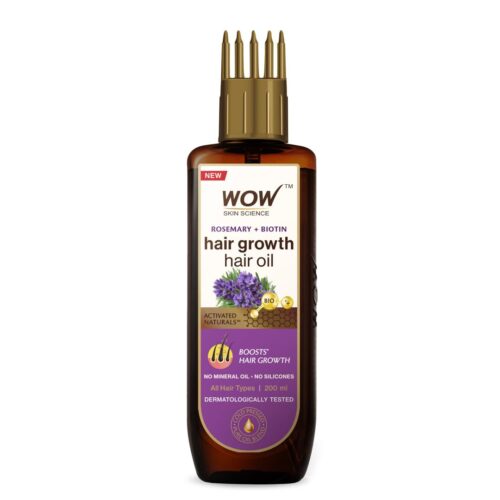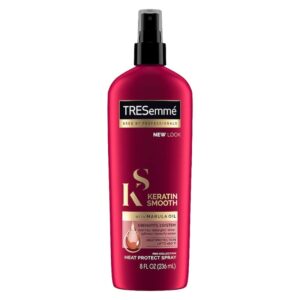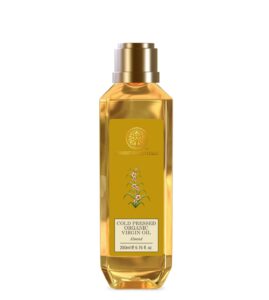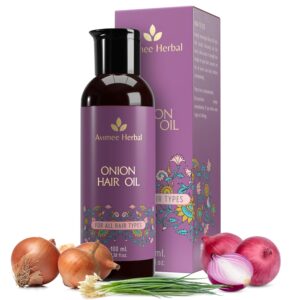- This Onion Hair Oil reduces hairfall, helps your hair grow longer, stronger and healthier. It contains the goodness of Onion and Coconut that makes it an effective hair growth oil
- Parachute Advansed Onion Hair Oil unlocks the real power of onion and helps it penetrate 10X deeper. Onion extract rich in anti oxidants which promotes hair growth
- Coconut is loaded with vitamins, triglycerides and natural polyphenols that provide nourishment to hair and helps in hairfall control and hair growth
- This Onion hair oil contains no parabens, no sulphates, no artificial dyes, no silicones, no formaldehydes and is completely Cruelty free. It also smells great.
- Suitable for all hair type from curly hair, wavy hair, straight hair, coloured hair, thick- thin hair, or chemically treated hair. This Onion Oil is safe to use & dermatologically tested
- Apply this Onion oil gently on your scalp and massage with fingertips. Let absorb for 30 mins, then wash off. If the hair oil solidifies in winter, dip in warm water for 2-3 mins
Advantages
Moisturization:
- Hydration for Dry Hair: Hair oils are excellent for providing much-needed moisture to dry and brittle hair. Oils penetrate the hair shaft and help seal in moisture, preventing further dryness.
- Scalp Nourishment: Oils can also moisturize the scalp, preventing dryness, flakiness, and itching, which are common issues that can lead to dandruff.
- Improved Hair Health:
Improved Hair Health:
- Strengthening: Oils like almond, coconut, and castor oil are rich in essential fatty acids, vitamins, and minerals that strengthen the hair from the roots to the tips, reducing breakage and split ends.
- Promoting Hair Growth: Certain oils, like castor oil and coconut oil, are believed to stimulate hair growth by improving blood circulation to the scalp and nourishing the hair follicles.
Protection:
- Damage Prevention: Oils can create a protective barrier around the hair, shielding it from environmental damage like pollution, UV rays, and harsh weather conditions.
- Heat Protection: Applying a small amount of oil before using heat styling tools can protect the hair from heat damage.
Reduced Frizz and Improved Manageability:
- Frizz Control: Oils smooth the hair cuticle, reducing frizz and making the hair more manageable, especially in humid conditions.
- Detangling: Hair oils can help in detangling hair, making it easier to comb through, which reduces breakage and hair loss during styling.
Shine and Luster:
- Enhanced Shine: Regular application of hair oil can give the hair a natural, healthy shine, making it look more vibrant and full of life.
Scalp Health:
- Soothing Effects: Oils like tea tree oil or peppermint oil have soothing properties that can alleviate scalp irritations, reduce inflammation, and combat issues like dandruff and psoriasis.
Natural Ingredients:
- Chemical-Free Care: Many hair oils are natural and free from harmful chemicals, making them a safer alternative to many synthetic hair products.
Disadvantages
Greasiness:
- Oily Appearance: One of the most common drawbacks of using hair oil is that it can leave the hair looking greasy and heavy, especially if applied too generously or not washed out properly.
- Frequent Washing Required: To avoid a greasy appearance, you may need to wash your hair more frequently, which can be inconvenient and may strip the hair of its natural oils if done excessively.
Build-Up:
- Scalp Build-Up: Regular use of heavy oils, especially without proper cleansing, can lead to build-up on the scalp. This can clog pores, potentially leading to scalp issues like dandruff or even hair loss.
- Product Residue: Oils can attract dirt and dust, leading to product residue if not washed out regularly.
Allergic Reactions and Sensitivity:
- Skin Irritation: Some individuals may be allergic to certain oils, leading to scalp irritation, itching, or rashes. It’s important to do a patch test before applying any new oil to your scalp.
- Sensitivity to Essential Oils: Essential oils, when used in high concentrations, can be irritating to the skin and scalp. They should always be diluted with a carrier oil before application.
Weighing Down Hair:
- Loss of Volume: Oils, particularly heavier ones like castor or olive oil, can weigh down fine or thin hair, making it look limp and reducing volume.
- Difficulty in Styling: Oily hair can be harder to style, as the oil can make it slippery and reduce hold, especially when trying to achieve certain hairstyles.
Staining:
- Stains on Clothing and Bedding: Hair oils can stain pillows, sheets, and clothing if not absorbed fully into the hair, which can be difficult to remove.
Not Suitable for All Hair Types:
- Oily Scalp Concerns: People with naturally oily scalps might find that using hair oil exacerbates the problem, leading to greasy hair and potentially more scalp issues.
- Heavy Oils on Fine Hair: Some oils may be too heavy for fine or thin hair, leading to a weighed-down look and making the hair appear flat.
Time-Consuming:
- Application and Washing: The process of oiling the hair, leaving it on for an extended period (such as overnight), and then thoroughly washing it out can be time-consuming and may not fit easily into everyone’s routine.
Hair oils can be highly beneficial for improving the health, texture, and appearance of your hair. They provide deep nourishment, protect against damage, and enhance shine, making them an essential part of many people’s hair care routines. However, they are not without their drawbacks, such as potential greasiness, build-up, and the possibility of allergic reactions.
The key to getting the most out of hair oils is to choose the right oil for your hair type and to use it correctly. If you have a dry scalp or dry hair, heavier oils like coconut or castor oil might be beneficial. For those with an oily scalp, lighter oils like jojoba or argan oil are preferable. Additionally, applying the right amount and ensuring proper washing techniques can help mitigate some of the disadvantages.
Ultimately, the benefits of hair oiling often outweigh the drawbacks, especially when used thoughtfully and as part of a balanced hair care routine.
WOW Skin Science Rosemary with Biotin Hair Growth Oil | Stimulates New Hair Growth | Controls Hair Fall & Reduces Hair Breakage | Gives Healthy Hair

- Made With Actives That Promote Hair Growth: This anti hair fall oil has 99% of naturally derived ingredients. Infused with Rosemary, Biotin and Hibiscus, this oil is rich in omega fatty acids, vitamin E, minerals, and antioxidants that help prevent hair fall and stimulate new hair growth. Rosemary stimulates new hair growth while biotin acts as catalyst by helping in keratin production.
- First sign of hair growth in 14 days: This anti hair fall hair oil helps to boost circulation to the roots, nourishes the scalp to help promote hair growth and enhance hair density. You can see visible signs of hair growth like baby hair strands, fine hair and dark shadows on your scalp in 14 days of usage. It’s a sign that our hair oil is working actively on your scalp.
- Blend of 9 cold pressed oils : This oil contains 9 cold pressed oils including Sesame, Olive oil, Castor, Sweet Almond, Amla, Black Cumin, Manjistha, Methi & Ricebran that nourishes hair from root to tip, giving a healthy & nourished hair
- Makes Hair Healthy: The nutrients in rosemary oil and hibiscus extracts nourish and moisturize the scalp. They help to strengthen the hair from the roots. Regular use of this hair oil has been proven to encourage new hair follicles. It improves texture and gives denser hair with healthy shine.
- No Harsh Chemicals Used: Harmful chemicals like parabens, mineral oil, silicones, sulphate, artificial fragrance or color have not been used. The products have a high concentration of natural actives and are pH balanced. They are dermatologically tested and are made in the beautiful mountain valleys in The Himalayas.
- Caution: When you begin to use this product, do a patch test before first use. We highly recommend this practice, as nature-based products can also cause allergic reactions. Also, if your skin is broken or irritated then avoid using this till skin repairs itself. Avoid direct contact with the eyes. In the case that happens, wash your eyes with plenty of water.




